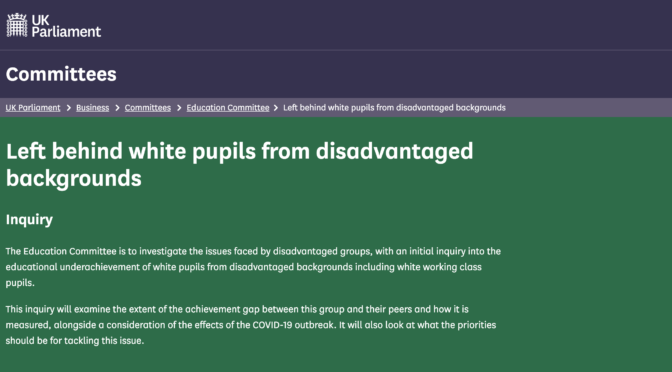Today I gave evidence to the Education Select Committee as part of its inquiry into working class white pupils, on behalf of the Centre for Education and Youth.
You can watch the full session here, or jump straight into the second half with me, Becky Francis and Mary Curnock-Cook:
During the session, I addressed some of the following points:
- ‘whiteness’ is not a marker of disadvantage
- gaps between ethnic groups differ at different stages of the education system
- the explanatory power of area types, aspirations, and opportunity structures
- area-based trends, and the need to focus on outer urban neighbourhoods
- are we more interested in relative or absolute social mobility?
- historically privileged groups will have to learn to face stiffer competition as historically marginalised groups gain more equal access to opportunities
- the importance of adult education and parental self-efficacy
- the influence of men in the teaching profession and school volunteering
- how to define ‘working class’ in the 21st century
- the utility of income- vs. free school meals-based definitions of ‘disadvantage’
- free schools meals is not the same as working class
- the importance of history and genealogy in discussing what ‘class’ means to people
- it’s not ‘politically correct’ to be concerned about the educational outcomes of non-white ethnic groups
- the negative role of low teacher expectations
- the slow rate of progress we’ve made in this area since 2014
- the relative reduction in funding to schools in the most deprived areas
- the importance of wider systems of support such as CAMHS
- the ‘forgotten third’ and the poor outcomes of young people with SEND
- young people’s attachment to place, and the problem of expecting young people to ‘move out’ in order to ‘move on’
- the importance of creating thriving local communities that attract young teachers
- the importance of adult education, lifelong learning and parental self-efficacy
Here’s a really short summary of the key issues I raised:
My views featured in a summary of the evidence presented during the session in The Guardian:

For more info, you might want to read:
- The written evidence submitted to the inquiry by the Centre for Education and Youth
- A full transcript of the evidence session
- My PhD thesis which explored how young people’s aspirations are shaped by the areas they grow up in
- Some of the research I’ve published on aspirations and meritocracy, and white working class boys in the education system
- A keynote speech (and slides) I delivered at Edge Hill University in 2019 called Taking the long view: how the ‘social mobility’ ideal breaks down at different stages for different groups of young people
- An opinion piece I wrote for Schools Week on how to speak to young people about their aspirations
- Previous CfEY reports on related topics, for the Greater London Authority, King’s College London, and the Social Mobility Commission
